Besieged Puerto Rico Governor Goes Quiet Amid Protests
Demonstrators swarm streets near Ricardo Rosselló's residence, asking him to resign over his leaked online chats insulting women and others.SAN JUAN, Puerto Rico—In the Spanish colonial fortress that serves as his official residence, Puerto Rico Gov. Ricardo Rosselló is under siege.
Motorcyclists, celebrities, horse enthusiasts and hundreds of thousands of ordinary Puerto Ricans have swarmed outside La Fortaleza (The Fort) in Old San Juan this week, demanding Rosselló resign over a series of leaked online chats insulting women, political opponents and even victims of Hurricane Maria.
Rosselló, the telegenic 40-year-old son of a former governor, has dropped his normally intense rhythm of public appearances and gone into relatively long periods of near-media silence, intensifying questions about his future.
For much of his 2 1/2 years in office, Rosselló has given three or four lengthy news conferences a week, comfortably fielding question after question in Spanish and English from the local and international press. And that’s on top of public appearances, one-on-one interviews and televised meetings with visiting politicians and members of his administration.
But since July 11, when Rosselló cut short a family vacation in France and returned home to face the first signs of what has become an island-wide movement to oust him, the governor has made four appearances, all but one in highly controlled situations.
New protests began Friday afternoon, with unionized workers organizing a march to La Fortaleza from the nearby waterfront. Horseback riders joined them with a self-declared cavalry march, while hundreds of other people came from around the city and surrounding areas. A string of smaller events was on the agenda across the island over the weekend, followed by what many expected to be a massive protest on Monday.
The chorus calling for Rosselló’s resignation was joined Friday by Puerto Rico’s non-voting member of Congress, Jenniffer Gonzalez; U.S. Sen. Rick Scott of Florida; and New York congresswomen Nydia Velázquez and Alexandra Ocasio-Cortez.
The crisis has even cut back Rosselló’s affable online presence. The governor normally started every day by tweeting “Good morning!” to his followers around 5 a.m. The last such bright-and-early message came on July 8. The tweets from his account have dwindled to a trickle since then, and each one is met by a flood of often-abusive responses from Puerto Ricans demanding he resign.
Rosselló’s secretary of public affairs, Anthony Maceira, told reporters Friday that the governor was in La Fortaleza working on signing laws and filling posts emptied by the resignations of fellow members of the leaked chat group.
The head of Rosselló’s pro-statehood political party said a meeting of its directors had been convened for coming days, although the agenda was not disclosed beyond “addressing every one of the complaints of our colleagues.”
Rosselló offered a press conference on July 11 to address the arrest of two of his former department heads on federal corruption charges. He also asked the people of Puerto Rico to forgive him for a profanity-laced and at times misogynistic online chat with nine other male members of his administration, short selections of which had leaked to local media. Two days later, at least 889 pages of the chat were published by Puerto Rico’s award-winning Center for Investigative Journalism, and things got much, much worse for Rosselló.
In the chats on the encrypted messaging app Telegram, Rosselló calls one New York female politician of Puerto Rican background a “whore,” describes another as a “daughter of a bitch” and makes fun of an obese man he posed with in a photo. The chat also contains vulgar references to Puerto Rican star Ricky Martin’s homosexuality and a series of emojis of a raised middle finger directed at a federal control board overseeing the island’s finances.
The next day, Sunday, Rosselló appeared in a San Juan church and asked the congregation for forgiveness, without informing the press. The church broadcasts its services online, however, and his remarks became public. On Monday, July 15, Rosselló gave a notably non-confrontational interview to a salsa music radio station. The governor’s spokesman said the questions had been “negotiated” between Rosselló’s press team and the station. That night, thousands swarmed Old San Juan to demand his resignation.
On July 16, Rosselló held a press conference and faced aggressive questioning about the chat scandal and the corruption arrests. Later that day, an ally tweeted a photo of Rosselló embracing Wilfredo Santiago, an obese man whom the governor had mocked in one of the most infamous sections of the chat.
Since then, it’s been silence. There has been a handful of tweets, press releases and statements, some saying he won’t resign but mostly about purportedly routine meetings of administration officials.
His official spokespeople aren’t answering many questions, and even his whereabouts are mostly unknown.
Rosselló was raised in the public eye, as the youngest son of Pedro Rosselló, who served as governor from 1993 to 2001. One of Puerto Rico’s most charismatic and controversial governors, the elder Rosselló launched a string of large-scale infrastructure projects that swelled the public debt and ensuing bankruptcy that his son has inherited.
Known widely as Ricky, the younger Rosselló started his political career in his father’s pro-statehood New Progressive Party. Trained in biomechanical engineering at the Massachusetts Institute of Technology, University of Michigan and Duke, he launched his campaign for governor in 2015 with little previous history of public service.
Deflecting questions about whether he owed his success to his connections, Rosselló portrayed himself as an affable technocrat with solutions to Puerto Rico’s debt and crumbling infrastructure, and by less than 3% of the total votes cast defeated David Bernier of Popular Democratic Party, which advocates greater Puerto Rican autonomy from the mainland United States.
Until now, Rosselló’s greatest challenge was Hurricane Maria, a Category 4 storm that struck Puerto Rico on Sept. 20, 2017, destroying the island’s power and communications systems. Rosselló came under heavy criticism for mismanaging the crisis, particularly for understating the deaths from the storm. While some of his deputies were vilified, Rosselló seemed to emerge relatively unscathed, perhaps due to his friendly and non-confrontational manner with critics, opponents and journalists alike.
The father of two young children, he often posts their photos online, along with images of his wife and their two rescue dogs, a Siberian Husky and a Yorkshire Terrier. Rosselló once halted a press conference to help local journalists move their equipment out of the rain.
Among the greatest shocks of the leaked chats for many Puerto Ricans was the puncturing of that image of low-key charm by the gross misogyny of online conversations.
“He was making an effort, carrying out his governor’s role,” said Jessica Castro, a 38-year-old San Juan resident attending a Friday evening protest with her family. “He was mocking everyone behind their backs, the people who believed in him. People are really disillusioned. He’s got to go.”
Your support matters…
Independent journalism is under threat and overshadowed by heavily funded mainstream media.
You can help level the playing field. Become a member.
Your tax-deductible contribution keeps us digging beneath the headlines to give you thought-provoking, investigative reporting and analysis that unearths what's really happening- without compromise.
Give today to support our courageous, independent journalists.
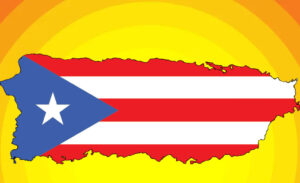
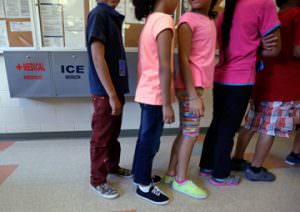
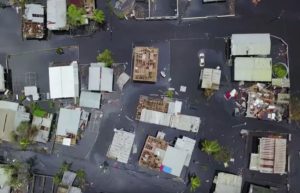
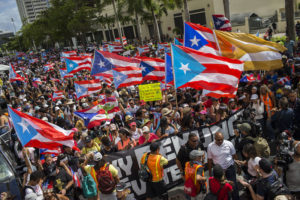
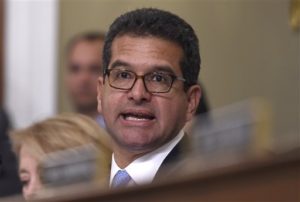
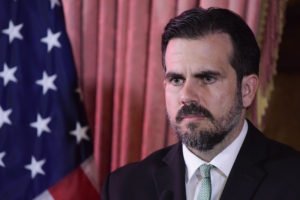
You need to be a supporter to comment.
There are currently no responses to this article.
Be the first to respond.